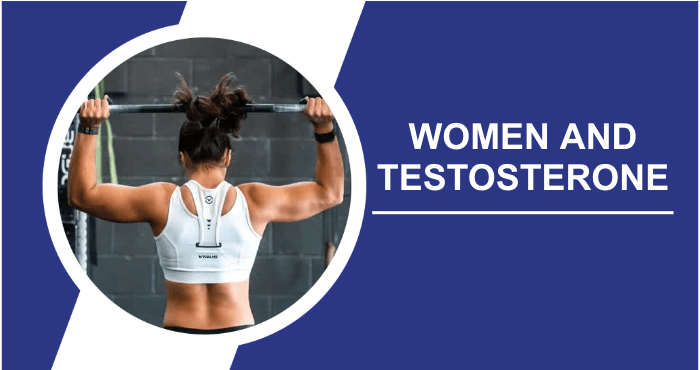Despite its common symptoms, low testosterone in women is often overlooked. Fatigue, decreased sexual desire, and deteriorating mental health can be debilitating, but women who experience these problems rarely attribute them to a lack of testosterone.
As a result, the condition often goes undiagnosed, leading to worsening symptoms. To remedy this situation, it is imperative to spread the word about the effects of the “male hormone” on the female body. In this article, we will take a comprehensive look at low testosterone in women, including methods for recognizing and treating it.
Low Testosterone In Women: How Does It Harm Your Health? Low testosterone levels in women can have significant health implications. While testosterone is often associated with men, it also plays a critical role in women's well-being. Low testosterone can lead to fatigue, decreased libido, mood swings, and decreased muscle mass. It can also contribute to bone density loss, increasing the risk of osteoporosis.
Hormonal imbalances caused by low testosterone can affect fertility and menstrual cycles. It is important to seek medical advice to address these issues and explore options for hormone replacement therapy, which can help restore hormonal balance and improve overall health and quality of life.
What Are The Most Important Hormones For Women In General?
Women’s health is strongly influenced by several key hormones, with estrogen, progesterone, and testosterone playing key roles. Estrogen, produced primarily by the ovaries, regulates the menstrual cycle, supports bone health, and contributes to reproductive development.
Progesterone helps maintain pregnancy and regulates menstruation. Testosterone, although lower in women than in men, affects mood, energy, and libido. Hormonal balance is critical to women’s overall well-being, affecting everything from fertility to mood stability.
What Is The Role Of Estrogens?
Estrogens are a group of hormones that are central to women’s health. They are produced primarily in the ovaries and serve several vital functions. Estrogen regulates the menstrual cycle, supports breast development, and plays an important role in maintaining bone density and reducing the risk of osteoporosis. It also affects mood, skin elasticity, and vaginal health. In addition, estrogens contribute to reproductive health by controlling ovulation and promoting the growth of the uterine lining for potential pregnancy.
What Exactly Is Testosterone?
When compared to other sex hormones, testosterone stands out as a potent androgen hormone typically associated with males. As this primary sex hormone surges during the onset of male puberty, it triggers the development of distinctive male characteristics, including:
- Growth of facial hair
- Broader shoulders
- Increased muscle mass
- Increased libido
- Increased sexual appetite
In men, the primary source of testosterone production is in the testes. In women, testosterone is produced in the ovaries and adrenal glands.
- Accurate testosterone measurement
- Appointment with a doctor
- Cream and injection options
- Price: $35 – $199
- Rating ⭐⭐⭐⭐⭐
What Is The Role Of Testosterone In Women?
While testosterone is primarily recognized as the key male sex hormone, it also plays an important role in women’s health. Typically, women have much lower testosterone levels, averaging about 15-70 ng/dL, which is about 1/20 to 1/40 of the levels found in men. However, the relatively low amount of testosterone in women does not diminish its importance. In women, testosterone contributes to:
- Increased sexual desire
- Increased libido
- Support of bone health
- Support of muscle mass
- Mood regulation
- Maintain energy levels
- Influence menstrual cycle and fertility
Clearly, maintaining appropriate levels of testosterone, along with other hormones, is critical. The balance between testosterone and other hormones is critical to a woman’s overall well-being. Imbalances, whether too low or too high, can lead to significant health problems. In summary, testosterone is a compound that brings vitality, youthfulness, energy and improved mental well-being to both men and women, underscoring its importance in our lives.
Signs Of Low Testosterone In Women
Low testosterone levels in women are a cause for concern and can affect individuals of all ages, from postmenopausal women to young, active adults. Similar to low testosterone in men, the signs typically take some time to manifest, with the severity and prevalence increasing over time. Common symptoms of low testosterone in women include:
- Reduced sexual desire and satisfaction (difficulty reaching orgasm)
- Feelings of anxiety or depression
- Increased emotional sensitivity
- Physical fatigue
- Weakened bones
- Joint pain
- Cognitive changes
- Difficulty sleeping (insomnia)
- Dry skin and thinning hair
- Weight gain
- Loss of muscle mass
- A sense of decreased motivation
Unfortunately, many of these symptoms can be attributed to factors such as poor sleep or increased stress, leaving many women unaware that low testosterone levels may be contributing to their health problems.
What Are The Consequences Of Low Testosterone In Females?
Based on my observations from interactions with friends who have experienced low testosterone levels and anecdotes from sources like Reddit and various online forums, a decline in testosterone among women can lead to a gradual worsening of symptoms, ultimately diminishing the quality of life. A common initial sign reported by many women is a sense of not being themselves anymore. This feeling is akin to depression, causing activities that were once pleasurable to lose their appeal.
Additionally, deteriorating sleep patterns often accompany this initial change, exacerbating other related issues. Subsequently, women may observe a decrease in their libido, which is currently the sole symptom for which exogenous testosterone may be prescribed. Finally, there are physical manifestations to consider. These could manifest as heightened muscle soreness or extended muscle recovery periods following physical exercise, eventually progressing to muscle weakness and potential muscle mass loss.
It is essential to recognize that each woman’s experience with low testosterone can vary in terms of symptoms and their severity. As previously mentioned, low testosterone levels in women typically result in a decreased enjoyment of life since testosterone plays a vital role in regulating various aspects of our identity and well-being.
How To Treat Low Testosterone In Women

Fortunately, there are several ways for women to increase their testosterone levels, ranging from simple lifestyle adjustments to the use of specific supplements.
- Improve sleep quality: Insufficient sleep is a major contributor to low testosterone in women, as it disrupts several physiological systems, including the adrenal glands. As mentioned above, the adrenal glands and testosterone production are closely related. The solution here is relatively simple – strive to get 7-8 hours of restful sleep each night.
- Include regular exercise: Exercise is one of the most effective ways to maintain healthy hormone levels. However, it is important to include resistance training in your routine, as excessive cardio exercise can increase cortisol levels. Find an appropriate workout plan designed for women and stick to it.
- Eat a nutritious diet: It is well known that the consumption of processed foods and added sugars can be detrimental to health and can lead to obesity and weight gain, with all the associated risks. In addition, an unhealthy diet can contribute to low testosterone levels in women. Studies have shown a link between diets high in processed foods and added sugars and low testosterone. Therefore, one of the most effective ways to combat low testosterone is to eat a healthy, balanced diet.
- Increase zinc intake: Although the body needs only a small amount of zinc, this trace mineral plays an important role. Among its functions, zinc is critical for testosterone production. Research has shown that women with inadequate zinc levels may experience low testosterone, and zinc supplementation may be beneficial. In fact, the importance of zinc in boosting testosterone is highlighted in our list of the best supplements for natural testosterone enhancement.
- Consider ashwagandha & licorice root: Both ashwagandha and licorice root are believed to be effective in treating adrenal fatigue and androgen deficiency. Ashwagandha, in particular, has garnered scientific support and has demonstrated the ability to independently improve testosterone levels.
- Explore testosterone boosters: Another option to consider is the use of a testosterone booster – a supplement that can be incorporated into your daily routine to potentially increase testosterone levels.
What Are Testosterone Boosters?
Testosterone boosters are dietary supplements made from a combination of herbs, plants, vitamins, and minerals designed to increase testosterone levels in the body. The effectiveness of a testosterone booster depends on its specific ingredients, but many of them, especially those containing vitamin D, zinc, and magnesium, work by addressing potential deficiencies in these essential nutrients.
It is important to clarify that testosterone boosters are different from testosterone replacement therapy (TRT). TRT involves the administration of synthetic testosterone through injections or other means and requires close medical supervision. Therefore, if you suspect low testosterone and are considering TRT, it is imperative that you consult with a healthcare professional. For individuals seeking a more personalized and supervised approach, TRT clinics or online testosterone therapy offer valuable options.
In today’s digital age, access to such clinics has become more convenient, with numerous online TRT clinics available. If you are interested in an online TRT clinic recommendation, I would like to recommend Fountain TRT. They offer a free personalized TRT evaluation that includes a testosterone test and a one-on-one video consultation with a Fountain provider to discuss your test results.
What Are The Most Effective Testosterone Supplements For Women?
It’s important for women to choose supplements that support hormonal balance without causing unwanted side effects. Some popular options include fenugreek, ashwagandha, and DHEA supplements, but it’s important to consult a healthcare professional before starting any new regimen to ensure it’s safe and appropriate for individual needs.
As A Woman, How Can I Increase My Testosterone Levels Naturally?
Boosting testosterone levels naturally as a woman involves several lifestyle changes. Prioritize strength training exercises, such as weightlifting or resistance workouts, to stimulate muscle growth and elevate testosterone production. A balanced diet rich in protein, healthy fats, and a variety of nutrients can also play a pivotal role.
Incorporate foods like lean meats, nuts, and leafy greens while reducing sugar and processed foods. Maintaining a healthy body weight and managing stress through practices like meditation or yoga can further support hormone balance. Adequate sleep and avoiding excessive alcohol consumption are essential factors in nurturing your body’s natural testosterone levels for overall well-being.
How Will My Testosterone Levels Change During Menopause?
During menopause, a woman’s testosterone levels typically undergo significant changes. In the years leading up to menopause, known as perimenopause, there is often a gradual decline in testosterone production, which can lead to symptoms such as decreased libido, fatigue, and mood swings. However, some women may experience a more pronounced drop in testosterone levels, making these symptoms worse.
After menopause, while estrogen levels remain low, there may be a slight rebound in testosterone production, contributing to improved sexual desire and overall well-being in some women. It’s important to note that these hormonal changes vary from person to person, and consulting with a healthcare provider can help effectively manage any associated symptoms.
- Accurate testosterone measurement
- Appointment with a doctor
- Cream and injection options
- Price: $35 – $199
- Rating ⭐⭐⭐⭐⭐
Frequently Asked Questions
Do women really have low testosterone levels?
Of course they do! Although testosterone is commonly associated with men, women also produce and need testosterone, albeit in smaller amounts. The occurrence of low testosterone in women can be attributed to several factors.
What are the signs of low testosterone in women?
Common signs include fatigue, decreased sexual desire, mood swings, and muscle weakness. It can also affect bone density and overall health.
What causes low testosterone in women?
Contributing factors may include the aging process, medical conditions such as polycystic ovary syndrome (PCOS), stress, and hormonal imbalances. It is advisable to consult a healthcare professional for an accurate diagnosis.
Is it possible to effectively treat low testosterone in women over the long term?
With proper guidance and ongoing monitoring, many women can effectively manage low testosterone and maintain hormonal balance.
Are there any natural ways to increase testosterone levels in women?
In fact, regular physical activity, a balanced diet, stress management, and adequate sleep can help to naturally optimize testosterone levels.
Conclusion
Low testosterone in women is an often overlooked topic, to the potential detriment of many. Understanding the associated symptoms sheds light on the significant impact it can have on quality of life. If you’ve been experiencing these symptoms but haven’t been able to identify the root cause, it’s advisable to make an appointment with a healthcare provider or consult an online TRT clinic for a comprehensive blood test to assess your testosterone levels.
Even without a blood test, you can take proactive steps to address low testosterone today. Incorporating regular exercise, prioritizing adequate sleep, and eating a balanced and nutritious diet can all contribute to your overall well-being and vitality.
Sources
- Olson BR. “Compounded Testosterone Preparations Raise Testosterone Levels to Premenopausal Ranges in Postmenopausal Women With Hypo-Sexual Desire Disorder (HSDD).” Journal of the Endocrine Society, 2020. Read more
- Davis, S. R., & Wahlin-Jacobsen, S. “Testosterone in women–the clinical significance.” The Lancet. Diabetes & Endocrinology, 2015. Read more
- Elizabeth Barrett-Connor and others. “The Association of Testosterone Levels with Overall Sleep Quality, Sleep Architecture, and Sleep-Disordered Breathing.” The Journal of Clinical Endocrinology & Metabolism, Volume 93, Issue 7, 1 July 2008. Read more
- Chen, L., Xie, YM., Pei, JH. et al. “Sugar-sweetened beverage intake and serum testosterone levels in adult males 20–39 years old in the United States.” Reproductive Biology and Endocrinology. Read more
- Mazaheri Nia, L., Iravani, M., Abedi, P., & Cheraghian, B. “Effect of Zinc on Testosterone Levels and Sexual Function of Postmenopausal Women: A Randomized Controlled Trial.” Journal of Sex & Marital Therapy. Read more
- Kalani, A., Bahtiyar, G., & Sacerdote, A. “Ashwagandha root in the treatment of non-classical adrenal hyperplasia.” BMJ Case Reports, 2012. Read more

